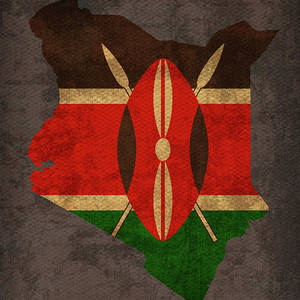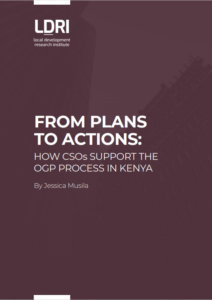![]()
Kenya models County Peer Review Mechanism for more responsive governance at the sub-national level

The Africa Peer Review Mechanism (APRM) is a continental level platform used to promote and enhance good governance through peer to peer learning and active public participation. Kenya has engaged on the platform from the early 2000s and it has contributed to systemic changes in the country’s national social-economic development. With the roll-out of devolution in 2013, with the mandate given to counties leadership to oversee their region’s socio-economic development the need to cascade the APRM mechanism was realised by the end of the 2017 electoral cycle.
Acknowledging Kenya’s need to actualise its developmental goals succinctly articulated in Vision 2030 and the Big 4 Agenda, Kenya’s APRM and Open Government Partnership (OGP) secretariats embraced a partnership approach to achieve their complementary goals. The 5th commitment under Kenya’s third OGP Action Plan sought to improve public sector performance through County Peer Review Mechanism. (CPRM). The CPRM derives from the continental model and pursues similar objectives at the local level.
Similar to the APRM process at the continental level, the ambition is to cascade APRM governance principles to the sub-national units (counties) across the country and allow Governors to peer review each other during a National Peer Review Conference after having gone through an objective, participatory process. The overarching objective is to improve service delivery performance linked to the local development plans that are co-created and implemented with the public throughout the annual country planning and budget cycles.
Conceptualisation of the CPRM process was the main focus of the 2018-2020 OGP action plan period. The Council of Governors (COG) has approved the concept and at least eight counties are expected to participate in the pilot phase of the initiative. It is expected to be implemented during the fourth OGP National Plan of Action subject to availability of funds. Counties that have expressed the desire to participate follow: Killifi, Taita Taveta, Kiambu, Nyandarua; Machakos ; Garissa, Meru , Isiolo, Kajiado, Nyamira, Siaya, Bungoma, Uasin Gishu, Kericho and Turkana.
A sensitisation forum bringing together interested government agencies and civil society representatives was held in December 2019. The NEPAD/ APRM Kenya Secretariat requested CSOs to consider adopting at least onea County, especially where they enjoy a good working relationship with the Governors and county officials. On the continental level, Kenya spearheaded the signing of a Memorandum of Understanding between the APRM and the OGP secretariats. This took place during the OGP summit in Ottawa, Canada in May 2019.
The APRM Kenya and OGP secretariat partnership in the CPRM piloting is a positive development for both initiatives. Within the Kenyan government, the APRM enjoys broad support, engagement and has strategic convening influence throughout all the Ministries, Departments and Agencies (MDAs) which is useful for deepening the openness agenda. On the other hand, the OGP platform provides technological knowhow to enhance citizen engagement; innovative thinking on resolving inclusion, transparency and accountability challenges and stringent timelines that push government and civil society actors to take action and report on their achievements faster.
Through the CPRM process, Kenya has an opportunity to showcase to the continent more responsive governance with broad government, civil society and the general public’s engagement and buy-in at the sub-national level. The OGP provides much added openness, citizen engagement and rigour to the transparency and accountability processes and helps service delivery. The synergy between two governance platforms will definitely help in deepening general government responsiveness to public demands on the national and county levels as well as entrench the culture of openness in Kenya.
Jessica Musila, Open Governance Fellow, Local Development Research Institute (LDRI)




